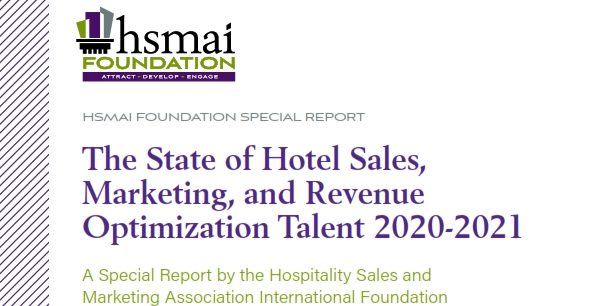By Karen Wollard, Ed. D., CHDM, HSMAI Research Manager
Within the hospitality industry, the pandemic has changed the way we recruit and attract new talent as well as what we’re looking for when hiring. The new job description for commercial teams is evolving quickly, as agility and the ability to capitalize on short-term changes become key skills. When historical data is no longer appropriate or sufficient, teams must let go of what was working and look for what will work now. This combination of innovative technologies and new challenges has created a need for learning and development that has outstripped the abilities of many organizations.
 According to a summer 2021 Hospitality Upgrade article written by Jennifer Hill and Cindy Estis Green, organizational structures are changing so the hotel’s revenue generation team is one unit, combining revenue and commercial analysis, sales deployment, and digital marketing spend. This has necessitated changing budgets and performance expectations. Smaller and more nimble teams were necessary to address the impacts of the pandemic. It will take time to determine whether this realignment continues. Commercial departments were slowly merging in most hotel organizations; the pandemic accelerated this.
According to a summer 2021 Hospitality Upgrade article written by Jennifer Hill and Cindy Estis Green, organizational structures are changing so the hotel’s revenue generation team is one unit, combining revenue and commercial analysis, sales deployment, and digital marketing spend. This has necessitated changing budgets and performance expectations. Smaller and more nimble teams were necessary to address the impacts of the pandemic. It will take time to determine whether this realignment continues. Commercial departments were slowly merging in most hotel organizations; the pandemic accelerated this.
Dr. Kelly McGuire, managing principal at ZS, stated in her presentation at HSMAI ROC Americas 2021 that the ability of these teams to achieve maximum market potential would necessitate key changes.
First, it is essential to delegate, automate, reduce, and eliminate the non-essential work that these key players have been performing. Second, the teams need to be reconstituted to ensure there is a mix of strategic thinkers, relationship builders, communicators, and business experts. More critical thinking and less data cleaning and report writing are needed if commercial teams are to be agile in delivering on KPIs.
A recent article by Drs. Peter Ricci and Anil Bilgihan in Hotel Business Review reported on insights from 14 revenue managers. They summarized the challenges this way: “The majority of revenue management models are based largely on historical data; however, incorporating big data such as the political environment, weather, flights, holidays, events, social reputation, and online prices/inventory, vaccination rates, number of daily COVID-19 cases [and] security of a destination into the algorithms, may help revenue managers to improve the accuracy of their forecasting. Through the effective use of big data in real-time, room rates or packages can be tailored to each guest which, in return, will maximize revenue and improve guest satisfaction.”
Challenges from technology, remote work, and smaller teams tackling the commercial activity together have also made it unclear what the goalposts are. KPIs and appropriate measures of success are changing rapidly, challenging managers to find new ways to monitor and upskill their teams.
Bonnie Buckhiester, president of Buckhiester Management, has authored several articles on the leadership roles that revenue managers, working with their marketing and sales counterparts, had to learn to play, beginning with, “Fish only where the fish are.” As the pandemic took hold, the convergence of revenue strategy and digital marketing rapidly progressed. Website data from marketing informed pricing decisions as booking windows shortened. Sophisticated business intelligence tools had to be acquired and learned if these teams were going to access real-time data about feeder markets, travel patterns, traveler sentiment and other nontraditional sources of data. Buckhiester contends that the pandemic has accelerated the shift to “fourth-generation revenue strategy directors” who, along with their numbers and analysis, are looking for clues to understand and better characterize demand. These are leaders who have acquired new skills that allow them to challenge tradition and discover new insights to finding demand.
Strategic thinking is more essential than ever in the commercial areas. People must follow trends and markets more closely and with new insight. Technology and year-over-year comparisons no longer substitute for a lack of planning and the need for comprehension of new dynamics and market forces.
In addition, organizational structures are changing so that the hotel’s revenue generation team is one unit charged with revenue and commercial analysis, sales deployment, digital marketing spend, and technology deployment. Budgets and performance measurements must change as these structures and duties evolve. Determining proper incentives and measures was a huge topic for sales, especially as the pandemic saw more than two years of hard-won sales fall off the books. Responsibility and accountability for action and execution are essential determinants of success for these new teams.
This is an excerpt from the HSMAI Foundation’s State of Hotel Sales, Marketing, and Revenue Optimization Talent: 2020-2021 special report. To learn more about the HSMAI Foundation and its mission, visit the Foundation website.
